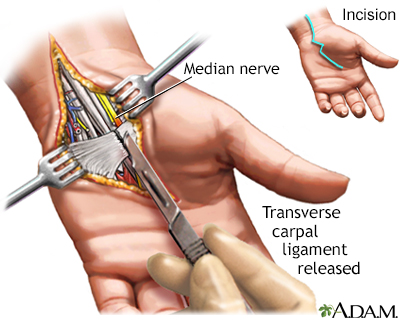Carpal Tunnel Syndrome Cause & Treatment


When to Contact a Medical Professional
Call for an appointment with your provider if:
- You have symptoms of carpal tunnel syndrome
- Your symptoms do not respond to regular treatment, such as rest and anti-inflammatory drugs, or if there seems to be a loss of muscle bulk around your fingers
- Your fingers lose more and more feeling
What is Carpal Tunnel Syndrome?
Carpal Tunnel Syndrome (CTS) is a common condition that causes numbness, tingling, and pain in the hand and wrist. It occurs when the median nerve, which runs through the carpal tunnel in the wrist, becomes compressed. This nerve controls sensation and movement in the thumb and first three fingers.
Causes of Carpal Tunnel Syndrome
Several factors can contribute to the development of CTS, including:
- Repetitive Hand Movements: Activities like typing, sewing, or using tools that involve repetitive wrist motion can irritate the median nerve.
- Medical Conditions: Conditions such as diabetes, rheumatoid arthritis, or thyroid disorders can increase the risk of CTS.
- Pregnancy: Hormonal changes and fluid retention during pregnancy can cause swelling, compressing the median nerve.
- Wrist Injuries: Fractures or trauma to the wrist may narrow the carpal tunnel, putting pressure on the nerve.
- Genetics: Some individuals have a naturally smaller carpal tunnel, making them more susceptible to CTS.
- Obesity: Excess body weight can increase pressure on the median nerve.
Symptoms of Carpal Tunnel Syndrome
Common symptoms include:
- Numbness or tingling in the thumb, index, middle, or ring fingers
- Weakness in the hand, making it difficult to grip objects
- Pain or discomfort in the wrist or hand, sometimes radiating to the arm
- Symptoms often worsen at night or during activities involving the wrist
Diagnosis
At Newman Regional Health Medical Partners Orthopedics & Sports Medicine, our specialists diagnose CTS through:
- Physical Examination: Assessing hand strength, sensation, and signs of nerve compression.
- Nerve Conduction Studies: Measuring how well the median nerve conducts electrical impulses.
- Electromyography (EMG): Evaluating muscle electrical activity to detect nerve damage.
- Imaging Tests: X-rays or ultrasounds to rule out other causes of wrist pain.


Treatment Options
Treatment for CTS depends on the severity of symptoms. Our team offers both non-surgical and surgical options to relieve discomfort and restore function.
Non-Surgical Treatments
- Wrist Splinting: Wearing a splint, especially at night, to keep the wrist in a neutral position and reduce nerve pressure.
- Medications: Nonsteroidal anti-inflammatory drugs (NSAIDs) or corticosteroid injections to reduce inflammation and pain.
- Physical Therapy: Exercises to improve wrist strength and flexibility.
- Lifestyle Changes: Ergonomic adjustments, such as modifying workstations or taking frequent breaks, to reduce strain.
Surgical Treatments
For severe or persistent cases, surgery may be recommended:
- Carpal Tunnel Release Surgery: A procedure to cut the ligament pressing on the median nerve, relieving pressure. This can be done via open surgery or endoscopic techniques.
- Minimally Invasive Options: Our surgeons use advanced techniques to minimize scarring and speed up recovery.
Recovery and Outlook
Most patients experience significant relief after treatment. Non-surgical treatments may take weeks to show results, while surgical recovery typically takes a few weeks to months. Our rehabilitation team will guide you through post-treatment care to ensure optimal recovery.
Prevention Tips
- Maintain a healthy weight to reduce nerve pressure.
- Practice proper ergonomics at work or during repetitive tasks.
- Take regular breaks to rest your hands and wrists.
- Perform wrist-stretching exercises to improve flexibility.
Why Choose Newman Regional Health Medical Partners Orthopedics & Sports Medicine and OrthoKansas?
At Newman Regional Health, our multidisciplinary team of orthopedic surgeons, physicians, advance practice providers, and physical therapists provides personalized care for CTS. We use state-of-the-art diagnostics and treatments to help you regain comfort and function.
Contact Us
If you’re experiencing symptoms of Carpal Tunnel Syndrome, schedule a consultation with our specialists today. Call Newman Regional Health Medical Partners Orthopedics & Sports Medicine and Ortho Kansas at (620) 343-6800

